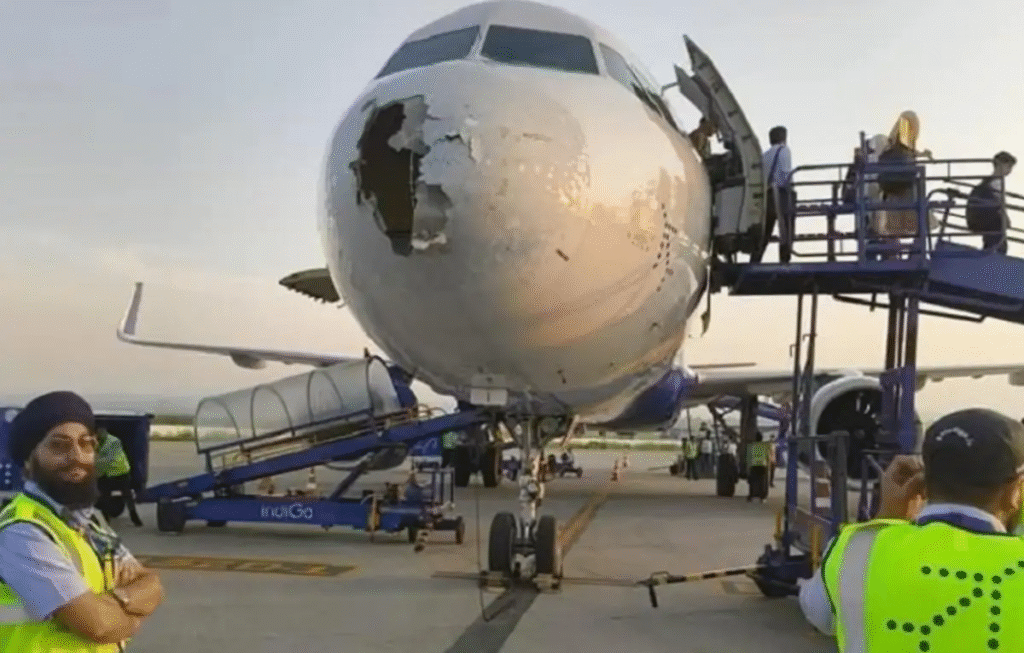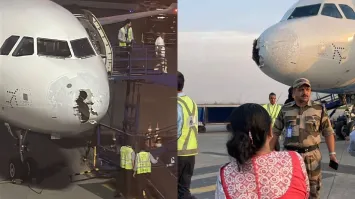
In a harrowing incident that tested the nerves of passengers and crew alike, an Indigo flight carrying 227 passengers found itself embroiled in a dangerous situation over Pakistan’s airspace. The flight, battered by intense turbulence and in urgent need of a safe landing, faced a dramatic refusal from Pakistani authorities to grant an emergency landing clearance. This heart-stopping event not only put hundreds of lives at risk but also raised critical questions about international aviation protocols and emergency preparedness.
The Journey Turns Perilous
The Indigo flight in question was en route to its destination, cruising at an altitude considered routine for commercial aircraft. However, the calm skies soon gave way to a fierce storm system that enveloped the plane, throwing it into chaos. The sudden turbulence rocked the aircraft violently, sending tremors of fear through the cabin. Passengers clung to their seats as the crew worked tirelessly to manage the situation, maintaining as much calm as possible under such extreme conditions.
As the turbulence worsened, the flight crew—aware of the growing risk to structural integrity and passenger safety—took the critical decision to request an emergency landing. The nearest viable option was in Pakistan, whose airspace the flight was traversing at the time.
The Denial of Emergency Clearance
In what can only be described as a controversial decision, Pakistani authorities denied the Indigo flight’s request for an emergency landing. According to reports, the refusal stemmed from security concerns and procedural rigidity. This denial left the flight crew with no choice but to brave the storm and continue flying. The decision sparked outrage, as it placed the lives of 227 individuals in jeopardy.
Aviation experts have since criticized the decision, highlighting that emergencies of this magnitude should transcend political or procedural barriers. The lack of immediate support from Pakistan highlights a glaring gap in international aviation protocols, where mutual assistance should be paramount during crises.
Navigating Through the Storm
Denied a safe harbor, the Indigo flight’s pilot demonstrated exceptional skill and composure. Forced to navigate through the intense storm, the crew relied on advanced radar systems and years of training to guide the aircraft through the turbulence. Passengers, though terrified, expressed gratitude toward the crew’s professionalism and efforts to ensure their safety.
Inside the cabin, the atmosphere was one of controlled panic. Many passengers resorted to prayers, while others clutched their loved ones. The cabin crew moved swiftly, ensuring seat belts were fastened and offering whatever reassurance they could. Despite the terrifying ordeal, the crew managed to prevent any injuries onboard.
The Role of DGCA and Post-Incident Analysis
The Directorate General of Civil Aviation (DGCA) in India promptly launched an inquiry into the incident, seeking to understand the sequence of events and assess the decisions made by all parties involved. Initial reports revealed the extraordinary challenges faced by the Indigo flight crew and underscored the refusal by Pakistani authorities as a critical point of contention.

The DGCA emphasized the need for improved coordination between nations when handling aviation emergencies. “Incidents like these call for a re-evaluation of existing protocols to prioritize human lives above all else,” an official stated. The regulatory body also praised the Indigo pilot and crew for their remarkable handling of the situation under extreme duress.
International Aviation Protocols Under Scrutiny
This incident has reignited discussions about the importance of seamless international cooperation in aviation emergencies. Industry experts have pointed out that emergencies are a shared responsibility, transcending geopolitical tensions. The refusal by Pakistan has drawn widespread condemnation, with calls for revising international aviation agreements to enforce compliance with emergency protocols.
Aviation analyst Rahul Mehta commented, “This is a wake-up call for the global aviation community. Denying emergency landings, irrespective of the underlying reasons, is an unacceptable risk to human life. We must ensure such incidents are not repeated.”
The Psychological Toll on Passengers
For the 227 passengers aboard, the ordeal left an indelible mark. Many described the experience as the most harrowing of their lives. Passengers spoke of the terrifying moments when the aircraft was engulfed by turbulence, with some admitting they had feared for their lives.
One passenger, Priya Sharma, recounted, “I thought it was the end. The plane was shaking so violently, and we could hear loud noises from outside. The crew kept telling us to stay calm, but it was hard to control the fear.”
Mental health professionals have since highlighted the need for psychological support for passengers involved in such incidents. Experts recommend airlines establish post-incident counseling programs to help passengers cope with the trauma.
The Importance of Training and Preparedness
The Indigo crew’s handling of the incident has been lauded as a testament to rigorous training and preparedness. Airline training programs are designed to equip pilots and cabin crew with the skills needed to handle emergencies, but this incident showcased the real-world application of those skills under extreme pressure.
Captain Arjun Reddy, a retired commercial pilot, remarked, “What the Indigo pilot did was nothing short of heroic. To navigate through such a dangerous storm after being denied an emergency landing is a feat that speaks volumes about their expertise and composure.”
A Call for Policy Changes
In light of the incident, aviation authorities worldwide are being urged to revisit and strengthen policies surrounding emergency landings. The primary focus should be on ensuring that no aircraft is denied critical assistance during life-threatening situations.
The International Civil Aviation Organization (ICAO) has called for an urgent review of global emergency landing protocols. A spokesperson stated, “Aviation safety is a collective responsibility. We must work together to create a framework where help is never denied in an emergency.”
Conclusion: A Story of Survival and Lessons Learned
The Indigo flight’s ordeal over Pakistan is a stark reminder of the unpredictable challenges faced in aviation. While the passengers and crew emerged unscathed, the incident has left a trail of questions and the urgent need for reform. From the bravery of the crew to the controversies surrounding Pakistan’s refusal, this event will undoubtedly serve as a pivotal case study in aviation history.
As the DGCA continues its investigation and the global aviation community rallies for change, one thing is clear: safety must always take precedence. The skies may be vast and unpredictable, but humanity’s commitment to protecting lives must remain unwavering.

